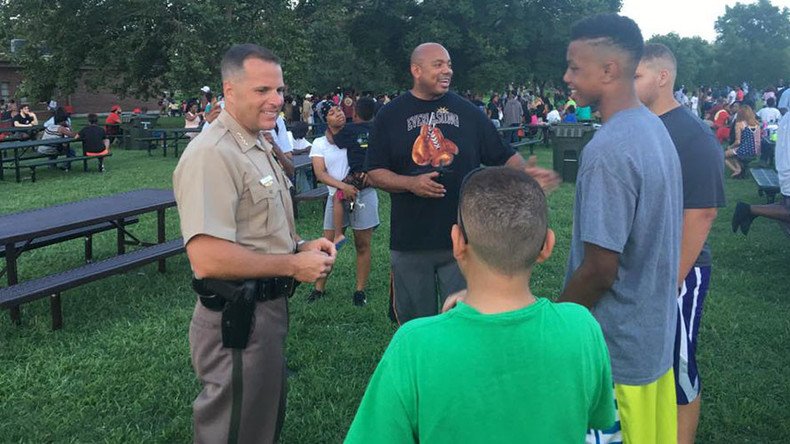Black Lives Matter protest becomes a picnic with police

What began as a planned Black Live Matter protest turned into a pleasant community gathering in Wichita, Kansas. With the nation still reeling from the murder of three police officers in Baton Rouge, hundreds set aside their Sunday to congregate for a barbecue.
In an effort to open lines of communication between the community and the police force, organizers of a Black Lives Matter protest met with Wichita Police Chief Gordon Ramsay to try something different. Instead of marching in the streets with police standing to the side, the two groups came together for the barbecue at McAdams Park in Wichita, Kansas.
The picnic drew a crowd of whites, blacks and Hispanics, spanning a wide age range, the Wichita Eagle reported. At one table, Jarvis Scott, a black man, sat down with Lt. Travis Rakestraw to eat hamburgers, marking the first time that he had sat with a police officer in 24 years. There were two others seated at that same table who had never done so: Ivan Ray, a Hispanic student at the University of Kansas, and a white man.
All of this was an effort to re-engage with community policing, that is, when an officer stays in a community and interacts with it. It was a higher priority during the troubled 1990s, as Capt. Rusty Leeds explained to the Wichita Eagle, saying, “then it was the gang violence, and now it’s the conduct of police.”
However, budget constraints drew the police’s efforts away from establishing themselves as members of the community.
While seated at a table with Rakestraw, Scott and the other two gentlemen, they discussed the issues that their sides had been facing. When asked about racial biases, Rakestraw told them, “Then it was the gang violence, and now it’s the conduct of police,” adding, “I don’t think anybody does it intentionally but we fill in the gaps with life experiences, what we read in the paper, and we start to view people as a generalization instead of understanding people as individuals.”
After a few hours, the picnic turned into a public forum to directly question Ramsay. Over the course of the question and answer session, Ramsay reaffirmed his dedication to police body cameras and pledged to review complaints about officer conduct by using the footage with the complainant.
“If you feel mistreated, I want to know about it,” Ramsay said. “If they feel they are being mistreated, at the scene is not the time to argue about it, wait until it’s over.”
When asked about officers with racial biases, Ramsay said, “Loud and clear I have zero tolerance for racial profiling or racial bias.”
#ACLU sues #BatonRouge police, calls for temporary restraining order on future protests https://t.co/sSzroA7Cqkpic.twitter.com/GV4CBEcFDV
— RT America (@RT_America) July 14, 2016
All three men seated with Rakestraw confirmed that they were still planning on marching, but appreciated that he seemed to care about what they were saying.
When Ray talked about racial disparities, Rakestraw said, “The community needs more people like you who can see the problems in wide open eyes,” then asked, “What should we do about it?”












